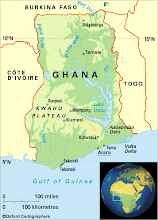On the way to visit Walton High’s two partner schools, Jamasi Methodist Junior High School and Akrofonso District Assembly Junior High School, we stopped off at a Kente cloth workshop to see the fabric being woven by men in the traditional way.
Kente cloth is worn by the Akan tribes during important ceremonies, but is world famous patterns and bright colours are now used to make many other products as well, including bags, flip flops, tablecloths and blankets.
Jamasi Methodist Junior High School & Akrofonso District Assembly Junior High School
We received a typically warm Ghanaian welcome from the staff and students at both of Walton High’s partner schools. Two classes joined together for an interesting question and answer session. We were encouraged to practice our very limited Twi. Thanks to the coaching I received from Bismark, one of Walton High’s caretakers, my effort received a round of applause, whilst my colleagues’ attempts were received with much laughter!
Despite the temperature being easily well over 32C a couple of students were wearing their jackets because they thought it was a bit chilly!
One of the questions we asked the students was about the start of their school day. Children arrive at 7am to clean the school and then they parade. During the parade they sing the national anthem and recite their pledge to Ghana. I asked one of the students looking on outside the classroom to video this for us. Stephen soon got to grips with the camera. Unfortunately, I am unable to upload the video at the moment because of the limitations of accessing the internet over a mobile modem. However, once I am able to do so I will add it to the blog.
Students were also asked what changes they would make to their school if they were the headteacher. We had some interesting responses to this. One boy said he would not allow teachers to beat the students - many others in the class also thought that this was a good idea. They also wanted more after school clubs. It appears that some extra curricular activites have stopped due to a lack of funds to run them.
The students were just as keen as the children in the street to have their photograph taken – it was clear that their concept of personal space and mine were very different!
Before we left Jamasi School we asked one of the teachers whether there was a toilet we could use. He replied that he would arrange for there to be one – which we thought was rather an unusual reply. Then Stephen, the boy who had videoed the class, arrived to escort us. We thought we were being shown where the school’s toilet was, but instead we were taken to his house! As he walked into the courtyard his mother looked up in surprise when she saw three white women in tow! It turned out that we were taken there because they had a water closet, i.e. a western toilet. Again, typical of Ghanaian hospitality, the family welcomed us to their home and allowed us to use the toilet.
The pictures below show the well in the courtyard of Stephen’s home and his baby brother cooling down in a large bowl of water.
As we left Jamasi School, the younger children waved us off.
Due to time constraints, we were only able to make a flying visit to Akrofonso School. We were greeted by both children from Walton High’s partner school and those from the school next door (the younger children in blue uniforms).
Many of the children at both of Walton High’s partner schools come from families that are surviving at subsistence level. Whilst education is free in basic schools, i.e. up to the age of 15 or until they successfully complete JHS3, families still have to find the money for uniforms, stationery and exam fees. This is a significant financial burden for most.
The Ghanaian Government is rightly concerned about Ghana falling further behind the rest of the world with regard to information and communication technology and as a result it has made ICT compulsory in all schools. Akrofonso School did have a few old second hand computers which were donated by a Ghanaian now living in the USA, but unfortunately they were not working when we visited. Mr Alfred, the Partnership Co-ordinator at Jamasi School, explained that he would also like to see a computer room at his school. We had a useful discussion about the practicalities of this, but as his school has electricity it is better placed than many to achieve this.













